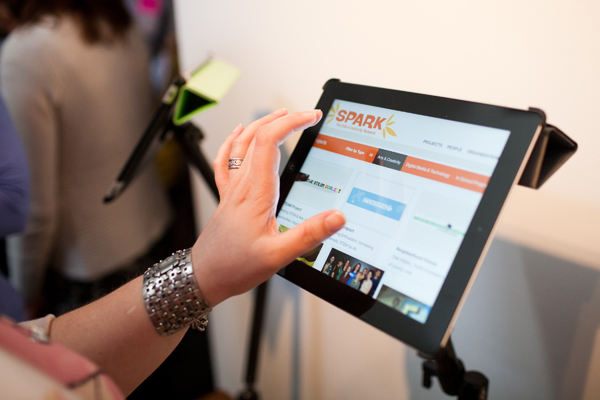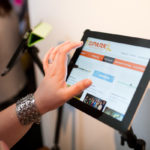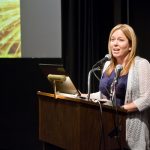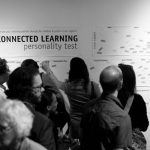
Spark + (Kids+Creativity) = New opportunities for kids’ learning and tech
Kids+Creativity has long been a resource for Pittsburghers whose work is at the intersection of technology, learning and play. Now, with the Kids+Creativity network newly placed under the direction of Spark — the Sprout Fund’s effort to foster new ideas for learning using digital media and the arts — the enthusiasm among K+C members is obvious.
“One of the hardest things is being a dot connector,” said Susan Brozek Scott, head of Afterschool Buddy, a developing kid-focused multimedia company in Hampton Township — and one of several hundred people crowding a room on April 16 to hear Spark’s Kids+Creativity plans. “If they can continue to do that, it’s going to benefit everyone. There are so many of us who need each other’s services and skills. Everybody has different organizations, but everyone has a common purpose in not only serving our own children’s population but reaching out across the country.”
Said Hedda Sharapan, director of early childhood initiatives for The Fred Rogers Company in Oakland: “The fact that there are so many people from so many different arenas who can feel the passion for doing something appropriately creative and innovative for today’s kids — that gives people a real motivation for what else we can do.”
“One thing that totally impressed me about Spark,” added Junlei Li of Pitt’s Office of Child Development — “Spark has really built a community and a network in a very short period of time.”
“And it’s through relationships that things happen,” concluded Sharapan – “especially in this town.”
“Three years ago, I sat in a coffee shop with a Sprout member and talked about what it would be like to do technology with children,” said Megan Fogt, manager of children’s services at Squirrel Hill’s Carnegie Library of Pittsburgh, who has been helping with Spark since its formulation. “I started out saying I’m not thrilled with a lot of the technology for kids, from birth to 2,” since children that young need more personal modes of learning. She recalls the Sprout staffer’s reply: “’Yeah. We’re not sure either. Come join us and we’ll figure it out.’ I looked at the first set of grant [applications] and I was like, wow! First of all, it’s amazing what people are already doing … and amazing what people are looking to do.”
The task for Spark’s future, Fogt said, will be figuring out how to balance the desire to support projects that dive into uncharted waters — projects that have the greatest chance for both failure and fresh findings — versus supporting projects by more established groups, covering more familiar territory, that may have certain success but less startling outcomes.
“They’re really thinking about how to have an environment that supports exploration and research on the cutting edge,” Fogt said.
Pittsburgh is now “uniquely poised to excel” at the juncture of high-tech and children’s educational needs, “given the history of innovation and the size of the market,” noted Sprout Executive Director Cathy Lewis Long when she and her staff spoke in a quieter moment about the changes at Kids+Creativity. Spark will be an intermediary between early childhood learning experts, with a hope “to spur conversations and try to connect these things in a strategic fashion, [remaining] broad enough that it would reach out to as many organizations and educational institutions as possible,” said Sprout’s deputy director, Matt Hannigan.
The network has had approximately 100 active members and another 200 on the periphery, up to now. Spark expects to add hundreds more and bring them all to the fore — and to each other — thanks to the breadth and variety of companies, agencies, start-ups and other organizations they’ve been working with over the past three years. In relaunching Kids+Creativity, “we want to open the gates and get a better sense to folks about how to engage,” said Hannigan.
Kids+Creativity was started by Gregg Behr, head of the Grable Foundation, and Behr has served as an informal but constant intermediary among its members. The new Kids+Creativity will use the “Sprout toolbox,” Hannigan said — providing catalytic funding for projects, sharing knowledge among experts and up-and-comers, and disseminating it to great effect — while adding a new set of capabilities. The network will also target an even broader audience who serve kids from pre-K through high school.
The next MicroSpark Award competition starts right away, with a June 1 deadline for grants of up to $15,000 for new, emerging and imaginative approaches to learning. According to Program Officer Mac Howison, Spark plans to examine the goals of Kids+Creativity as it intersects with DIY and DML (digital media learning) with the intention of putting out a few “strategic” requests for proposals, with larger money on offer. Spark is also looking to create smaller-scale sponsorship opportunities for one-time events and activities.
Dustin Stiver, another program officer, says Spark will also begin to offer several fellowships each year to bring academics here to work on DML research. Spark will also help Kids+Creativity members to form new affinity groups, get stipends for conference attendance, and develop other ways of using their talents. The group also expects Kids+Creativity members to inspire more Lunch and Learn events, such as a May 23 gathering about permaculture design principles and DML requested by Don Orkoskey of The Schmutz Company — and inspired by a previous Lunch and Learn.
“We’ll be doing a lot of work to expand outside the city limits” as well, says Stiver, and will try to add kids’ voices to the mix. “We don’t want to be a group of adults who meet each week to talk about how kids learn. We want to get some kids involved in that process.”
Getting more adults involved is the goal of the completely revamped Kids+Creativity Website, still in beta. It is designed to let users find people, projects, groups and the most recent posts more easily. Spark plans to add a storytelling feature with a blog-like interface to aggregate members’ work, and has commissioned artists, writers and videographers to chronicle members’ efforts.
“Everyone can have a showcase of their work that functions as an online portfolio” and a way of finding project partners, said Hannigan.
Long believes the new Kids+Creativity will bring local projects more often to the national stage. “By collecting ourselves as a network, it’s much easier to talk about the movement that’s happening here in Pittsburgh,” she said.
Spark will hold a public comment session on its new Website design on May 14.
“So it’s going to be a busy late spring and early summer,” concluded Hannigan, “but it’s something we’ve been gearing up for.”




